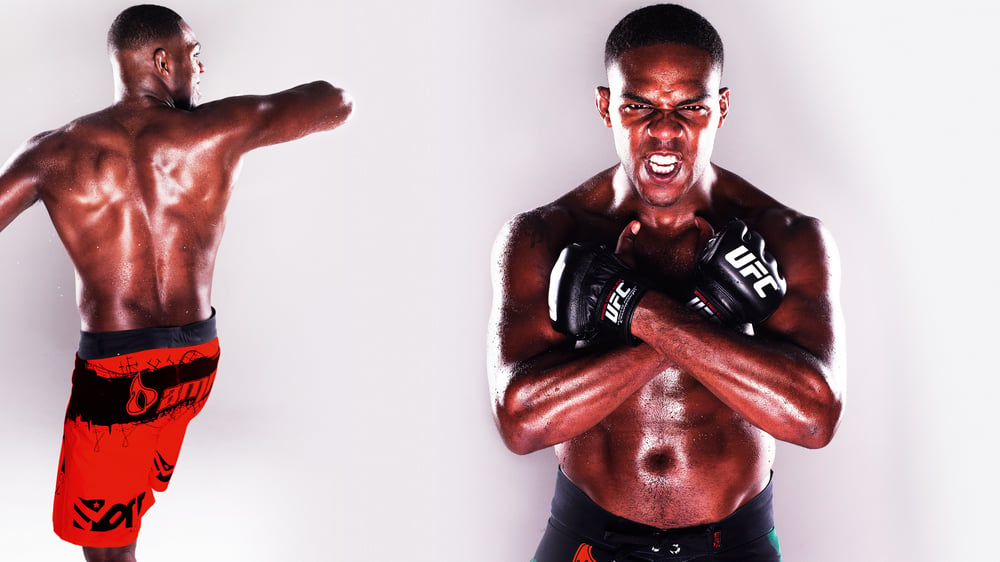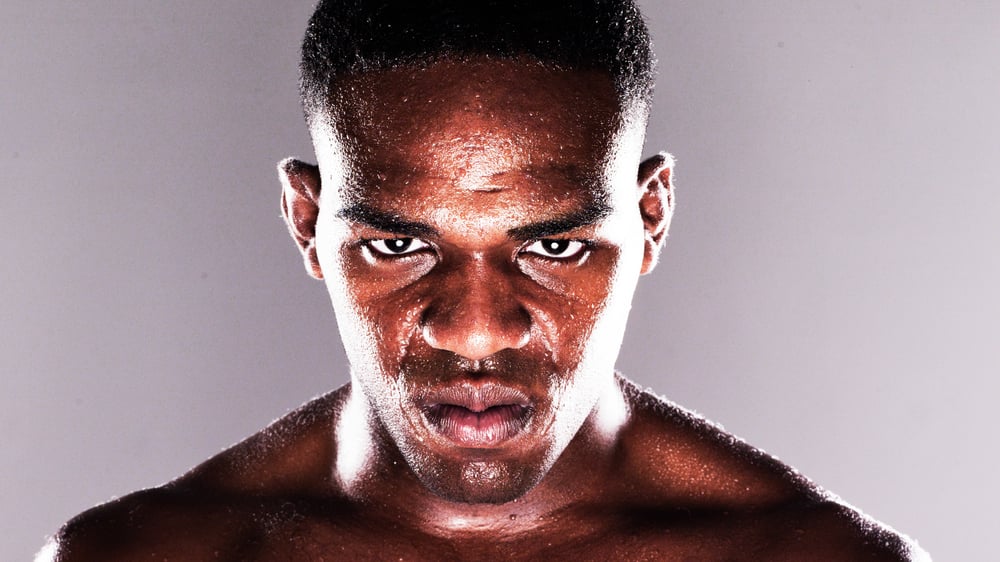
Issue 083
December 2011
UFC phenom Jon Jones reveals it’s the critics rather than the fans who keep him striving to break boundaries inside the Octagon.
A few weeks after retaining the UFC light heavyweight crown, Jon Jones is contemplating his standing with the fans. There is little doubt that he has become the enfant terrible of the 205lb division in the last 12 months as other fighters contemplate a way of unlocking his exquisite fighting style. But the criticism he has had from some quarters might appear unmerited. What has Jones done wrong? He has done all that has been asked of him as a champion. He has stated he will duck no one, and has admitted he has a long way to go.
Inside the Octagon, he is now regarded as a man who could shift the paradigm, and that effect has already begun. Yet still there are highly charged critics among the sport’s fan base. He has wise words on the subject. Indeed, the 24-year-old revealed he is actually lapping up the criticism, dissecting it and responding behind the scenes to those who are branding him as ‘arrogant’ and ‘cocky.’
Some say he has changed since winning the world title. Jones laughs it off, but he breaks down the critical scrutiny in the same manner he breaks down opponents in fight camp with head trainer and strategist Greg Jackson. In an exclusive interview with Fighters Only, Jones revealed he uses negativity against him as a motivating force.
He realizes not everyone is going to like his style, his method of fighting, or even his persona. He also revealed he has broken down how developed his skill set is, in percentages. What Jones clearly displayed in this interview is just how mature he has become at dealing with the fluctuations of his status.
So, how does he deal, mentally, with the criticism coming his way? “I look at it like this: it’s something I’ve learned (over the last few months). I use the 10-80-10 rule. There are 10% of the audience out there who love you, no matter what. No matter what I do in the Octagon, no matter what I do in my personal life, no matter what mistakes I make, in my personal life or in fights, those people will always love you. If I fight badly, if the contest is poor, they are still there for me. That 10% will always be in my team, and will always encourage me. Then there will be 80% who are on the fence. If I get a knockout, they’ll like me; if I pull off a sweep, they’ll think I’m cool. Some days they love you; some days they hate you. And some days they just don’t care. Then there’s the other 10%. That’s the group that are going to hate you, no matter what you do, no matter how good a person you can be, no matter what you say, they are going to hate you. No matter what. They are going to find a way to hate you. Oh, he’s trashy, oh, he’s religious, he doesn’t finish fights… and so on.
“That’s something I’ve learned, and something I’ve incorporated into who I am. The 10-80-10 rule. So what I do is focus on the 10% of people who love me, and encourage me, and care for me. I look for what group they fall into and, if it’s the bad 10%, I’ll just block them on Twitter, for example.”

Negativity, insists Jones, is a powerful tool if used right. “I’m grateful for the negativity. It makes me sharper, it can educate you at a young age. When I first joined the sport it was great, everyone was encouraging, and then, suddenly, I started to get more criticism. I wanted everyone to like me, but today, at 24, I’m still young, but my soul is learning to deal with the negativity, the haters. I’m at the stage where it just doesn’t bother me anymore. It’s making me a better professional, so by the time I’m 28… well, you can imagine.
“It’s been interesting, you know. I’m actually happy that I’m starting to have image flaws and things like that ’cos it’s like conversations I have with my manager and he’s like ‘Jon, you’re doing everything right, right now.’
“It’s kind of like I’m put up there sometimes as the UFC’s golden boy, and I don’t wanna be the UFC’s golden boy. I just wanna be me you know. I don’t wanna be the future, I don’t wanna be the guy who can’t make mistakes and do no wrong or the guy who can’t swear in an interview. I’m just me; a snotty-nosed 24-year-old who got good at fighting. It seems that now everybody cares about what I say.
“There’s nothing wrong with being a golden boy but that’s not why I’m here, I never asked to be called the future or this or that. Everybody else is putting all these tags on me and I’m just being me and the people that find me ‘cocky’ now or ‘arrogant’ or say this or that, I’m actually grateful for the negativity in my career.”
Incredibly, Jones rates himself at present at being not even halfway to being as good as he will eventually become. “As a fighter, I’m at about 40%. I’m at 20% with jiu-jitsu, 70% with my wrestling and I reckon my boxing is at 30%. So I still have a whole lot of learning to do.”
There is little doubt that he wants to leave a legacy. “I want to be a role model but at the same time loosen up and be myself. It’s a weird medium.” Malki Kawa, Jones’ agent, explains: “It’s about being a professional but at the same time being able to live his life without everyone staring at him.”
Jones added: “I think being marketable is a good thing; I want to secure a future. I look at Georges St Pierre and I’m not there yet. But I want to be like that. He’s a good guy, he has a clean image. I want to be able to have the power to bring Nike into it, into MMA.
“I definitely look up to Georges in a lot of ways. He’s an awesome fighter, a disciplined athlete, he’s dedicated, wears a suit, carries himself with a smile on his face. He’s one of the ultimate professionals. My goal is to be even better in my career. I want to learn from these champions and be the champion of champions.”
By all accounts, Jones is like ‘a sponge’ in training, soaking up moves, according to teammates. “There’s no secret to that. I think my passion and desire to want to be better than I am today is what gives me the motivation for that. It’s a combination of those things,” he admits. “I study moves on the internet. I look at moves on YouTube, I’ll watch a lot of K-1, traditional Muay Thai stuff, I look at prowrestling.com. There are a lot of wrestling techniques on there. It’s like an online seminar.”
But downtime matters, too. Jones also revealed he likes to have complete time off between contests. “I’ve got a long career ahead of me and I don’t want to waste years in the gym taking damage, so I think it’s good for me to be a young guy with a solid bounce on life. I’m being ‘Jon Jones the Father’ and ‘The Lover’ and then ‘The Athlete’ so I’m glad that I got to separate it... I want to look back when I’m an old man and be like, ‘I had some fun, man, I won some fights, had my ups and downs but it was fun.’”

Many have wondered if there is ‘a switch’ which turns on when he gets into fight mode but the champion insists that it’s just confidence in the ability when the time is right, rather than working himself into a peaking mental state.
He states: ‘There is no switch. You know the techniques are there already. It’s just putting that game face on when it’s time I guess. When I fight, it’s methodical and relaxed. I think Bruce Lee said it best, ‘He extends, I retract.’ I want to use my knowledge, and all my techniques, never fight out of anger, or say, ‘I’m gonna rip his head off!’ It’s all about breaking opponents down.”
How is he dealing with all the responsibilities of being a champion? Other holders have talked previously about how it takes it away from their ability to grow as a fighter, but not Jon Jones. “I deal with it great,” he reveals. “I still keep a child-like attitude at my gym. I’m not the champ when I walk into Greg Jackson’s gym. I’m their little brother, they know how much I don’t know, how much work I need to do on my ground game, how much work I need to do on my power and my tracking. I just keep it fun for the most part and just not worry about it too much.
“I just learn how to be myself even more and continue to play the game and be my team’s little brother. All my team are champions in my opinion, all of ’em; like Keith Jardine. That guy isn’t even in the UFC anymore, but he’s a champion. He’s an old lion, man. He just walks around the gym like that, you know? Little people to me are champions. ‘Cowboy’ Cerrone, Carlos Condit; these guys, they’re tough old lions who’ve been around. These guys have been fighting for so many years. I don’t know anything. I just keep working hard and things are gonna happen for me.
“It’s just a complete journey, man. I just do the usual thing, I try to visualize the fight. I watch it every night. I watch this fight and then I take out the opponent out of the ring and I imagine the way I would move and what I would’ve done. The biggest thing is just watching that fight and visualizing every time you’re going to protect and things you’re going to see and, then when you get in there, you can prove that, yeah, I knew that would’ve worked.”

Not surprisingly, the list of sportsmen who ‘Bones’ admired when he was growing up reflects his style of fighting, his athleticism. “It was Michael Jordan, LeBron James, Muhammad Ali and Bruce Lee.” In his own sport, it is Anderson Silva. “Got to be... because it’s dynamic, effective, it’s lethal, and it’s free-flowing. I wouldn’t say it is natural, I think it’s a lot of hard work that over time it can begin to look natural, but it’s a lot of dedication. I just love the effort he’s put into his mechanics.”
Jones cites the Silva title defense against Chael Sonnen as one which stands out.
“The fight against Chael Sonnen was just, I don’t know, it just added to Anderson Silva’s legacy of having heart and being a champion. He fought through having a broken rib, well, bruised ribs, so he’s down and still managed to get up and Anderson still managed to pull off a victory, so hats off to that. Pretty much all of Anderson’s career, even when he wasn’t as technical he’s still just an amazing fighter, lethal.”
I wrote a column for Fighters Only last year, looking at what MMA might have become. ‘It’s the year 2020, Jon ‘Bones’ Jones has earned $40million, MMA is the most popular sport, and Jones has been light heavyweight champion for a number of years,’ I predicted, yet does the champion himself truly believe it will ever grow to that extent?
“Absolutely. Right now, the UFC is the number one pay-per-view in history and it’s the fastest-growing sport in the world and we’re only at 30%. What will happen when we get into Japan and every other country across the world? I feel as if I jumped into this sport at the perfect time and I wanna ride this wave and be right along with it. I want to be a part of that martial arts history.”
Blood, sweat and tears
Jon Jones insists the lowest point of his career remains one of the biggest driving forces in his continued education. Losing to Matt Hamill, albeit by disqualification due to illegal elbows, still bites. “When they actually said, ‘And the winner is... Matt Hamill’ I felt as though I had no control, it hit me really hard. I was crying a little bit too, I talked to Greg and he said, ‘You can’t control everything man, it’s over now, make the best of this,’ and I pulled myself together.”
Come dine with me
So you’re the poster boy of the fastest-growing sport on the planet, but who inspires you? Jon Jones reveals who he would invite to dinner if he wanted to learn around the table. “I would invite Muhammad Ali and LeBron James, because they’re both brilliant, they are people I admire and I’d love to be on that level one day,” he states without even taking time for thought. “Denzel Washington too, and Michael Jackson – if he was still here. He was a genius. I heard that he knew every note and every chord in every song on every instrument; he was a master of what he was into, even his dancing. It’s like a fighter learning different moves.”
...









